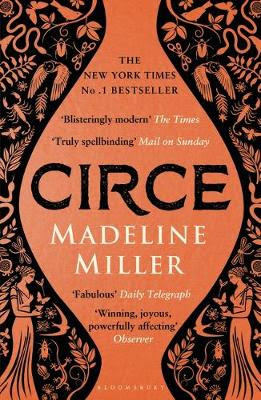Book #39
Circe by Madeline Miller
In the house of Helios, god of the sun and mightiest of the Titans, a daughter is born. But Circe has neither the look nor the voice of divinity, and is scorned and rejected by her kin. Increasingly isolated, she turns to mortals for companionship, leading her to discover a power forbidden to the gods: witchcraft.When love drives Circe to cast a dark spell, wrathful Zeus banishes her to the remote island of Aiaia. There she learns to harness her occult craft, drawing strength from nature. But she will not always be alone; many are destined to pass through Circe's place of exile, entwining their fates with hers. The messenger god, Hermes. The craftsman, Daedalus. A ship bearing a golden fleece. And wily Odysseus, on his epic voyage home.There is danger for a solitary woman in this world, and Circe's independence draws the wrath of men and gods alike. To protect what she holds dear, Circe must decide whether she belongs with the deities she is born from, or the mortals she has come to love.
This was my first time meeting Circe. Yes, my copy of Homer’s epic has remained in place on my shelf for around thirteen years or so, ashamedly so. So it remains that Miller’s version of Circe is the only one I have for reference at the moment, but it’s such a beautiful depiction that I can almost forgive myself for the lack of expertise on my part.
True, she’s a lesser known god, born without any apparent powers or skill. But it’s her resilience, her determination to become, and her traceable growth throughout these pages which make her one of the greats in my eyes. Exiled, shunned, cruelly treated, she adapts, improvises, and ultimately reaches a height of power which stuns mortals and gods alike. Each of her abilities and nuggets of knowledge are born from situations she’s had to overcome; she persists, she thrives, and she expands.
The story is so intricate that it absolutely requires a perfect writing style to support it, and Miller really delivers here. The words almost dripped off the page for me in their lyrical beauty; the worlds of gods and mortals intertwined in an almost poetic vessel of complete beauty. I was grasped by the words, and held tight as I was swept through this tale of absolution.
And through it all, despite her elevated immortal status, Circe’s various stages of joy and pain struck me as incredibly relatable. Despite her physical reactions to these being beyond the scope of any of us, her emotions, her sentiments, and her fire remain inherently and irrevocably human.

